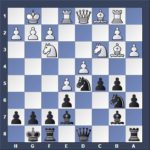Ask Questions at the end of this page.
These tips explain various facts in chess you should know to play properly and to understand the value of material. Chess pieces are valued differently depending on the situation. There is an objective value assigned to each piece but this value does change somewhat during the game as pieces move from one square to the other.
There are situations where a pawn can have a higher value than a rook
or where two pawns are stronger than a knight or bishop.
As you proceed playing chess often you will get more experience and the feel for estimating values more accurately.
Objective Value of Chess Pieces
There is no value assigned to the king as you can’t play chess without king.
Queen – 9 Pawns
Rook – 5 Pawns
Bishop – 3 pawns
Knight – 3 Pawns
This means you can trade your queen for two rooks in some positions. This is a good business for you, as you give 9 pawns (your queen) but get a value of 10 pawns.(2 rooks have a combined value of 10 pawns)
Or you can sacrifice a knight for 4 pawns as your knight only has a value of three pawns. But this depends how effective the knight is placed. You wouldn’t give a strong centralized attacking knight for 4 pawns in some positions. The true value of your knight might be much higher depending on its position.
Black Moves
If Black captures the rook then White will recapture and the pawn moves one row ahead. This would increase the value of the pawn as it would be placed closer to the last rank where it can be promoted. Best is to retreat the rook playing Rc8 or protecting the rook playing Kb8. However White is losing anyway…this example is just to clarify how the value of a pawn can increase.
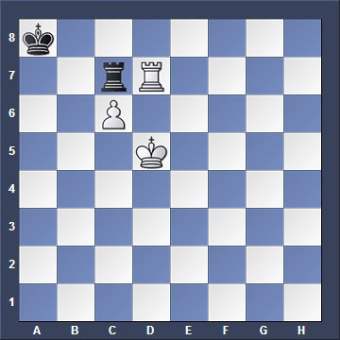
Black moves
The three white pawns have a higher value than the bishop. This is because sooner or later the bishop must sacrifice itself for one or two pawns. After this White will win with the remaining last pawn.
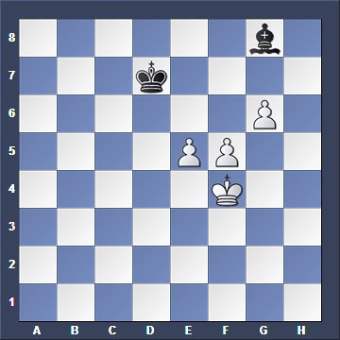
Forks
| Pawn Fork White played c4 and attacks two pieces |
Knight Fork White wins the rook. |
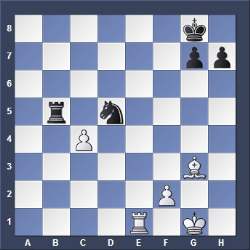 |
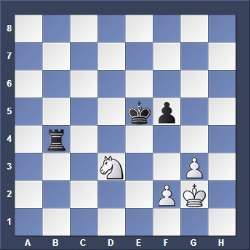 |
| Bishop Fork White can play Bc4+ winning the rook. |
Rook Fork The rook attacks the king and the bishop |
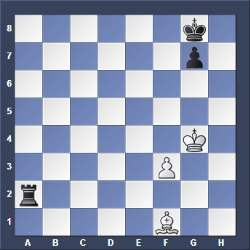 |
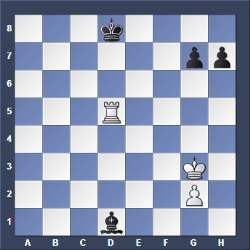 |
| Queen Fork White wins the rook |
Bishop double attack |
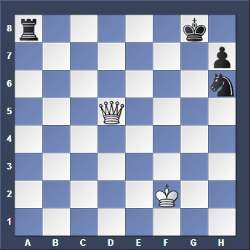 |
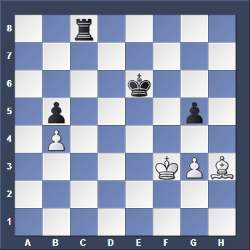 |
Where to place Rooks?
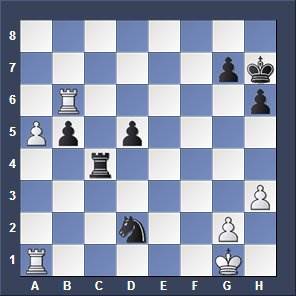
1. Rule: Place the rooks BEHIND your passed pawn!
2. Rule: Place the rooks BEHIND OPPONENT passed pawn!
As you can see in the diagram above the white rooks are placed perfectly BEHIND
the white passed a-pawn and BEHIND the opponents passed b-pawn. The white rook on a1 SUPPORTS the run of the a-pawn. The white rook on b6 STOPS the run of the black b-pawn which is unable to go to b1 as it cannot pass the square b2 which is controlled by the rook at b6.
Learn about the Chess Pin
Chess Sacrifice
Ask Chess Questions here
Go from – Chess Tips to – Chess Strategy – Home
Get UNIQUE Chess Courses from Chess Grandmaster Igor Smirnov (Ukraine)! BIG DISCOUNT! Click here!



